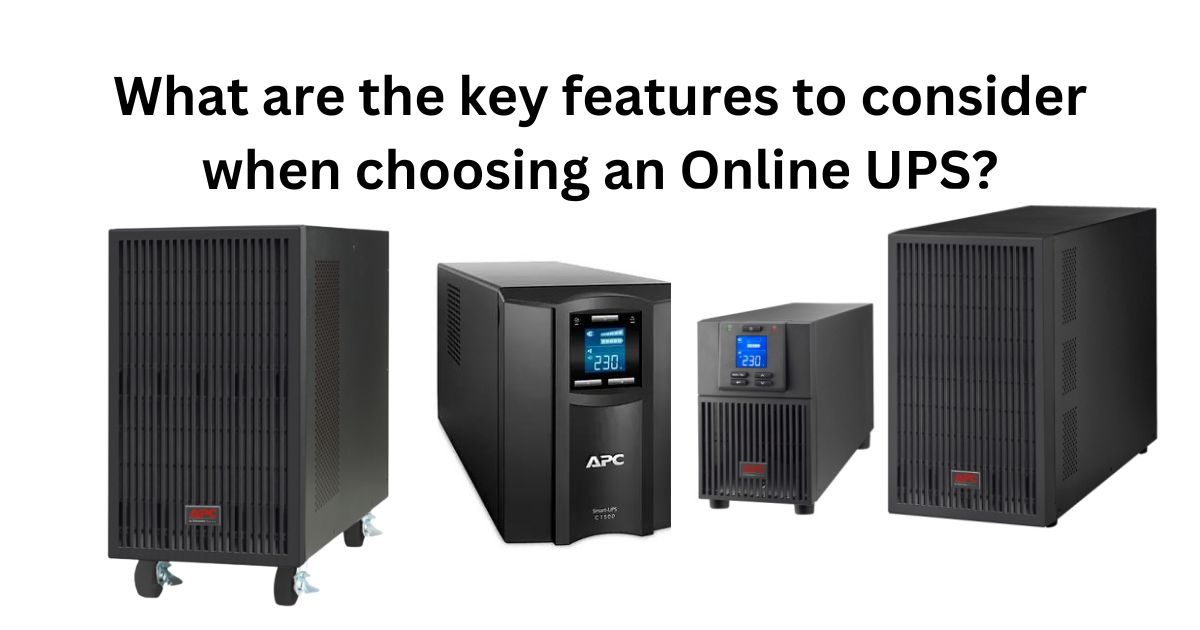When an organization designs and builds a large project such as a data centre, hospital, industrial unit, etc., its design is not complete without an uninterruptible power supply system. In typical conditions, a UPS is required not only to provide backup power in case of power failure but also to protect connected equipment from power fluctuations, spikes, surges, frequency variations and line noise, etc. Therefore, a good quality online UPS system plays a vital role in the smooth functioning of any organization.
The online UPS helps you bridge the time gap between power failure and generator start-up. Each type of device is different in its operation, technology, size and operational efficiency. Therefore, it is essential to choose the right UPS system according to the required applications.
What is an online UPS?
The online UPS is the ultimate form of power conditioning and protection for any critical application. A true on-line UPS system completely isolates the connected equipment from the raw power line. A good UPS system protects the connected equipment from spikes, surges, brownouts, line noise and frequency changes.
The on-line UPS consists of a rectifier, battery charger, inverter and control circuitry. The rectifier converts alternating current into direct current. When AC current is present, the battery charger charges the batteries and the rectifier supplies regulated DC current to the inverter. The inverter, with the help of the control circuitry, inverts the direct current into an alternating current. By converting the main power supply to DC and then regenerating the AC power, the inverter effectively insulates the connected equipment from all kinds of electrical pollution.
In the event of a power failure, even for a few seconds, the UPS simply draws power from the batteries instead of the rectifier, so there is no interruption or break in the power supply. While the role of the UPS system is clearly defined, the reliability and stability of different types of UPS systems should be closely examined before purchasing a UPS system online.
Before selecting a UPS, it is essential to determine and analyze how long users are likely to run their UPS in the event of a power failure. It all depends on the user’s needs. Some users want backup power for a few minutes to continue operations until the generator is turned on, while others want to run their load connected to the backup power continuously until the main power is restored.
Power requirements
The first step is to analyze the required capacity of the online UPS. To do this, you need to know the electrical load of the connected equipment. To do this, you can ask the inverter manufacturers for advice. Ask an inverter manufacturer if they are willing to perform an energy audit at your site to verify the electrical load. Some inverter manufacturers can perform an electrical audit at a nominal cost or sometimes even without a service fee.
Specifications
You need to consider the features required for your particular application. For example, if your application is industrial, an inverter with an integrated isolation transformer is a must. Other features such as a wide input voltage range and a wide input frequency range should also be considered.
Experience and reputation of the manufacturer
You should try to source from a manufacturer that has been in the market for at least 10 years and has sufficient experience in the field. Since many companies open and close in a short period of time these days, the manufacturer you intend to use should be stable enough to last a long time. Also, try to refer to their list of installations in your area.
Warranty
Most companies offer a one-year warranty on their products. However, we recommend that you try to get a good deal on an additional year of warranty for a small additional cost.
After-sales service
One of the most important factors in choosing an inverter is the after-sales service. The manufacturer should be able to provide quick service in case of failure and should have the necessary spare parts. Inverter importers are usually dependent on their original supplier, which can lead to delays in providing service. You also need to consider how long the manufacturer is willing to provide service for a particular product and keep the corresponding spare parts on hand. Some good manufacturers provide service and retain spare parts for a product that may have a life span of 10 to 15 years. In contrast, many UPS system vendors simply tell the user to upgrade the UPS system after 7 or 8 years, citing the unavailability of spare parts, which unfortunately results in additional capital expense for the user.
Final thought
Whether you are purchasing a UPS for a data center, IT enterprise or industrial application, it is very important to invest in a reliable and efficient online UPS system. Therefore, to find the right UPS, you need to determine which UPS system is best for your application. UPS The Online Store can help you determine the inverter system that will meet your needs. If you have any further questions or need advice, please feel free to contact us.


